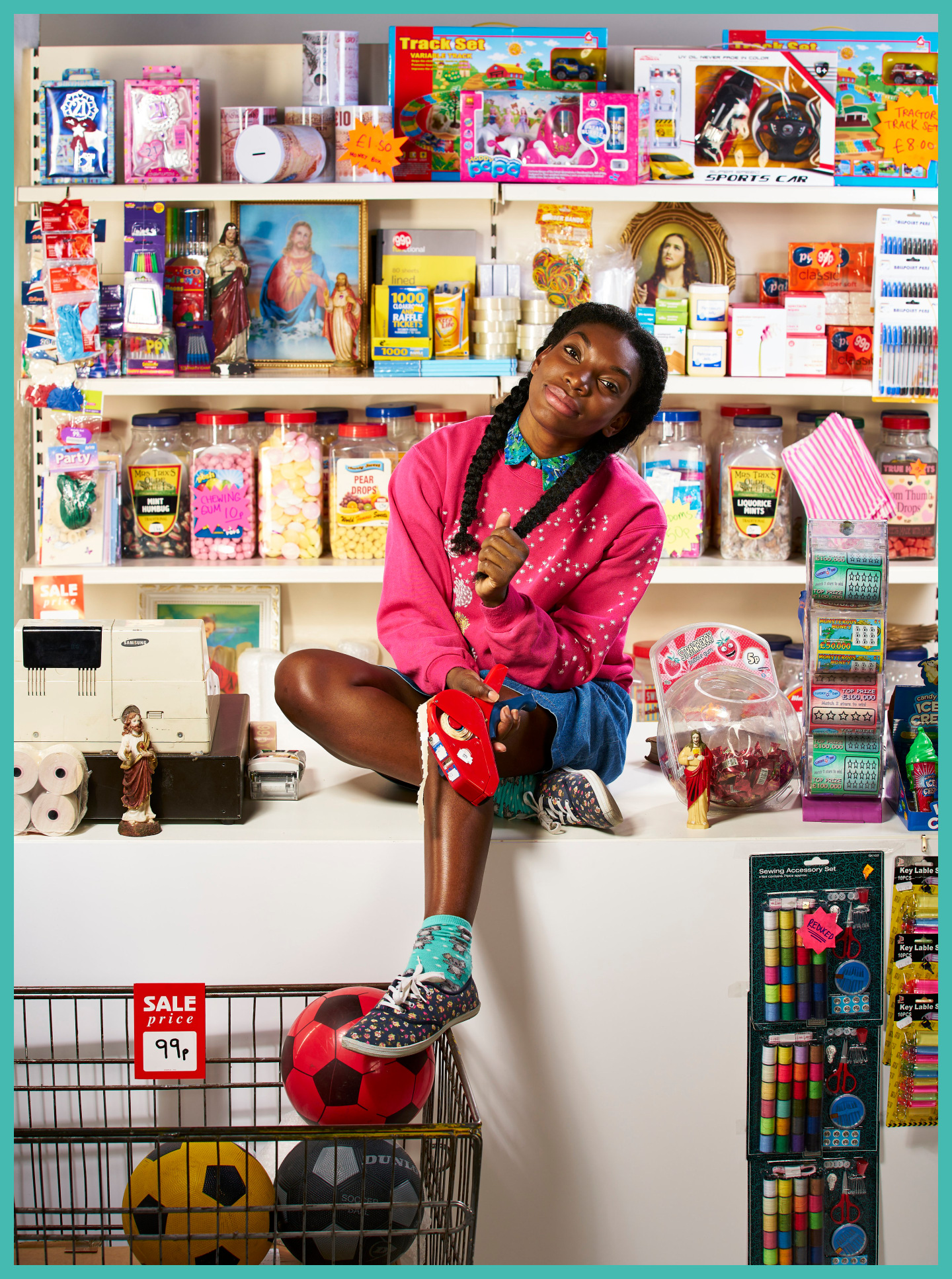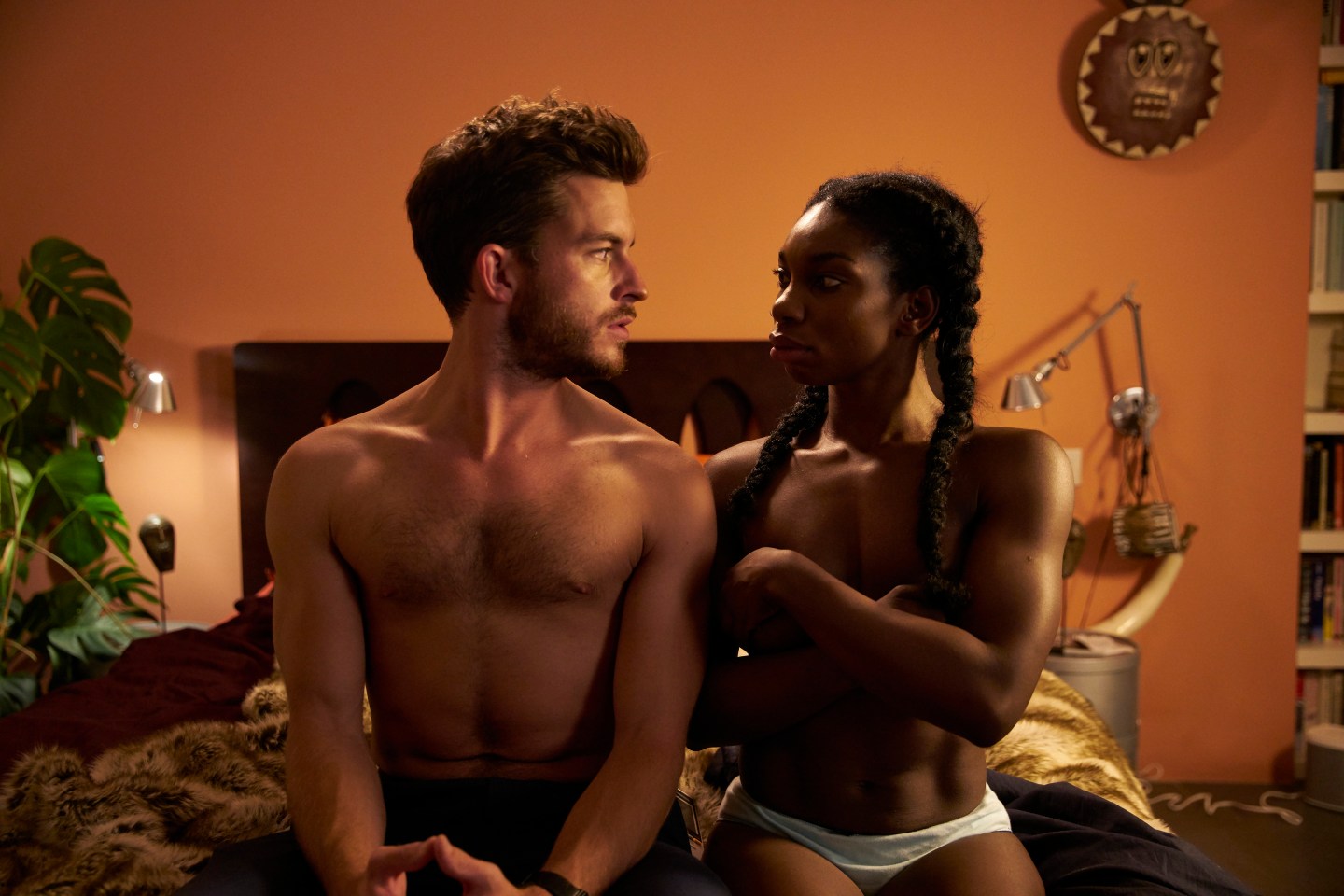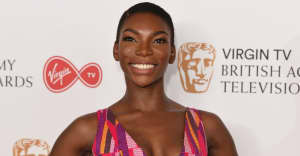 Michaela Coel pictured in character as Tracey Gordon, in Chewing Gum
Filiz Tosun/Netflix
Michaela Coel pictured in character as Tracey Gordon, in Chewing Gum
Filiz Tosun/Netflix
Michaela Coel never stops testing boundaries. She is gleefully uncensored in her outrageous sitcom Chewing Gum, calls out institutional prejudice on Twitter, and relishes personal challenges in her work. When we talked by phone in March, she’d just wrapped a long day of filming for her upcoming role as a single mom in Been So Long, a London-set musical telling a love story through an R&B and neo-soul soundtrack. The role presented a couple of obstacles: “I’m not really a children person,” she tells me with a laugh. “But I’m learning to bond with them. And I haven’t done any singing for a while — I’m quite shy about that.”
News of Coel’s reserve may surprise viewers of her explosively funny show, which returns for Season 2 this week on Netflix. Lovable lead character Tracey (Coel) is still on a madcap mission to lose her virginity against the wishes of her evangelical Christian family. She gets into increasingly extreme situations in the six new episodes, from finding herself at a back-alley sex party, to dressing up as a racist caricature to try and please a date. Chewing Gum delights in brashness, vulgarity, and libidinous pleasure, as a counterpoint to shows that attempt to depict intimacy but cut the scene just as it heats up. But it's its brilliant supporting cast that helps give Chewing Gum its big heart, with beefed-up roles in Season 2 for Tracey’s flamboyant gay friend Olà and her bookish sister Cynthia, as well as a fantastic Stormzy cameo (“I just slid into his DMs!” Coel hoots).
In the past it might have been tough to find a mainstream TV show that passed the DuVernay test. But in the few past years, the dominance of TV streaming platforms and new digital channels has helped the small screen offer an inclusive ecosystem for diverse voices in a way that Hollywood can’t — or won’t — provide. Against this backdrop, Chewing Gum’s wide-ranging representations of the black British working class experience aren't just brilliant, they're crucial.
In a thoughtful chat, Coel discusses the real-life inspirations behind Chewing Gum’s most shocking moments, colorism in the black community, and her advice for young black girls everywhere.
In Season 2 of Chewing Gum, Tracey meets a guy named Ash who asks her to dress up in a “tribal” outfit. It’s a really uncomfortable moment. Do you think a good way to confront racism is to make it seem ridiculous?
Yeah, I do. I think the foundations of racism are ridiculous. I also do know that racism comes with a lot of pain, violence, murder, rape, slavery — and those [issues] are covered by people that don’t write comedy. But I'm writing comedy and so I like to be able to tackle issues in the medium in which I'm being paid, which I think is possible. It was nice to see a lot of black women and a lot of black gay guys could identify with that [situation] so much. They could see it from [Tracey and Ash’s] first scene, ’cause we’ve all been through it. I think it's important to create an awareness that sometimes we are fetishized by people. It creates a dialogue.
You’ve said that some moments in Chewing Gum are based on real life events — was that scene inspired by tokenism you experienced?
Absolutely. I had this guy that I was seeing; he texted me one day and I said, “I’m just with my cousin.” And he said [laughs] “How about I come over, and you’ll be the only black girl getting dick in the house.” I was like, “Okay, I'm unfortunately never going to see you again.” I always hear, “I've never been with a black girl before,” or, “I only go out with exotic girls.” I find it a little bit gross. It just means that you see people for their skin color.
Do you think you're able to push boundaries further on Chewing Gum because it’s a British show?
No. I think that I am who I am, and that’s my sense of humor. If I moved to America and I lived there for 20 years, it’s gonna be the same kind of show that I make here, we’d just have different accents. I feel like there's a bunch of really awkward people whose lives make other people uncomfortable, and they're all across the globe. I look forward to an American writing a really awkward, embarrassing, boundary-pushing show.
Issa Rae's Insecure comes close to that narrative.
Yes. I kind of worship Issa Rae. I hear the comparison a lot — that Chewing Gum is like the British Awkward Black Girl.
Do you see Insecure and Chewing Gum related in any specific way?
Absolutely. I think by virtue of the fact that we are both black and female, [they are] going to have some threads of similarity, even though we’re across the pond from each other. The same is true for Donald Glover's Atlanta. Even Get Out the movie — when you asked me about the [Chewing Gum] episode with the [racist] guy. I thought, There’s definitely traces of that in Get Out.
 Ash (Jonathan Bailey) and Tracey (Michaela Coel) in Chewing Gum Season 2
Filiz Tosun/Netflix
Ash (Jonathan Bailey) and Tracey (Michaela Coel) in Chewing Gum Season 2
Filiz Tosun/Netflix
On Twitter, you said how Get Out made you see beauty in your blackness, whereas some black viewers I know felt sad or angry after watching it. Why did it make you feel empowered?
There’s no reason to feel sad. A lot of dark-skinned women will talk about [the fact that] black men are not attracted automatically to dark-skinned women. When we go to a club and we see a black guy that we like, we're the only race that says, “Oh, I don't know if he's into me.”
The reason I felt so amazing after Get Out was because I'm aware that I'm beautiful inside and out. [But] the reason why maybe my own race isn't interested in me is because they have Post Traumatic Slave Syndrome. Before slavery, I don’t think [black men] looked at women and thought, “Urgh.” This has happened because of trauma in the black race, and I'm not gonna be mad about that. And that might mean that, hey, I'm a little bit exclusive, and there’s gonna be a couple of kings out there that will be interested in me.
There's a few amazing black men out there that are intelligent and have done the math, have unpicked their mindset, and see things from a broader perspective. One of the things I want to say to all these dark-skinned girls who are actually feeling sad about that, is: Why would you want to waste your time on guys like that? Why would you want to waste your time with anyone like that?
In the show, you seem so secure in your own skin and with showing your body. Did you have to work to get that confidence?
Chewing Gum was based on my play [Chewing Gum Dreams], which was a one-woman show and I'm in my underwear at some points. So I think naturally, my line of ‘this is not appropriate’ is further away than your average writer’s. I've always been willing to make a fool out of myself. Maybe it’s due to drama school, clowning around. I went to Guildhall [School of Music & Drama, in London]. [I used to do] a lot of weird physical work, rubbing up on people.
“Having diversity behind the screen affects so much. I can watch a TV show, and tell you: No one in there is BAME. There might not even be any women involved in that.”
You were an evangelical Pentecostal Christian for a number of years. During that time, were you more reserved?
No, because as a Christian I was a poet, and my poems were really out there. There's still [footage of readings] on YouTube. There was one about being desperate to be liked by the industry — about how I would do anything, I would take off all my clothes, I will have sex scenes… And actually I did become that person, which is interesting.
In U.K. parliament, Riz Ahmed recently gave a speech about the lack of diversity in TV and cinema. You were mentioned as an “exception that proves the rule.” Has that been your experience — behind the camera as well as in front of it?
My God, it is bleak, mate. It is bleak. Having diversity behind the screen affects so much. There are so many times when I've been on a set and I'm looking at the extras: You've got a hundred white and Asian extras wearing office-wear — so why are all the black extras playing janitors? People don't see those things unless they are an ethnic minority. So many times on jobs, I have had to say, “Do you see that that's how you've done it? You're not thinking.” I can watch a TV show, and I can tell you: The exec, the producers, the directors….No one in there is BAME. There might not even be any women involved in that.
How do you counterbalance that when you're hiring your own crew?
When you showrun it, it's not so bad. My exec [producer] for Chewing Gum is black. The continuity lady was black, the production coordinator was black. There's just a difference. I don't mean to be a dick, but the atmosphere on my show…I feel it, and I know that my cast feel it. ‘Cause when they go to other jobs they’re like, ‘Damn, I miss the vibe!’
Did you find it shocking when Samuel L. Jackson said that race issues don't exist as much in the U.K.?
All I can say is my own story. I was born here. I've been a victim of racial abuse, of racial attacks, of people stereotyping me. I know many other black British people who have been a victim of those things.
And I can say to Samuel that I don't know if we've been interracially dating for hundreds of years; I'm not sure that that's true. [After reading his comments,] at first I was hurt because [British people] feel so connected to America. We acknowledge that America is going through different trials and tribulations than we are. When we go through those trials, like Trump being made president and Trayvon being murdered, we cry. We fucking weep. I mourn.
But what I've heard from many Americans is that this isn't the viewpoint of all of Black America. And I don't know if it’s the viewpoint of most of Black America. In many ways, [the U.S. is] actually further ahead than we are [in the U.K.], and we're kind of looking to them. They know how to fight. There’s also a larger middle class in America. They have their space, they're strong. They know how to protest. We don't really know how to do any of those things, we're still kind of in the very British [mindset of]: ‘Oh, it’s fine. There’s a lot of us in prison but we’re not really talking about it.’ So I would implore Samuel to have some empathy.
You shaved your head in March, and wrote about how that choice was misinterpreted by some. How do you feel about it a few weeks on?
It's the third time I've shaved my head, and I love it. I feel freer, and I feel sexier. When I've got a lace wig on, or a weave, I feel sexy but in the back of my mind I'm like, This isn't my real hair, so keep it humble because at any moment someone could just drag that off your head. [laughs] But with no hair, it’s like, There's nothing you can do to touch me! I'm a sexy motherfucker.
But oh my god, yes. You shave your hair, and a bunch of people think you're this kind of feminist that's like, ‘Women shouldn't do that, women shouldn’t do this, batty-riders is this, twerking is this.’ I’m like, Please. I'm still twerking in the club — even though I don't even know how to twerk. I’m just like: Do whatever the hell you want.
Watch Chewing Gum Season 2 on Netflix (U.S. and global) or All 4 (U.K.).
Additional research by Lakin Starling.
